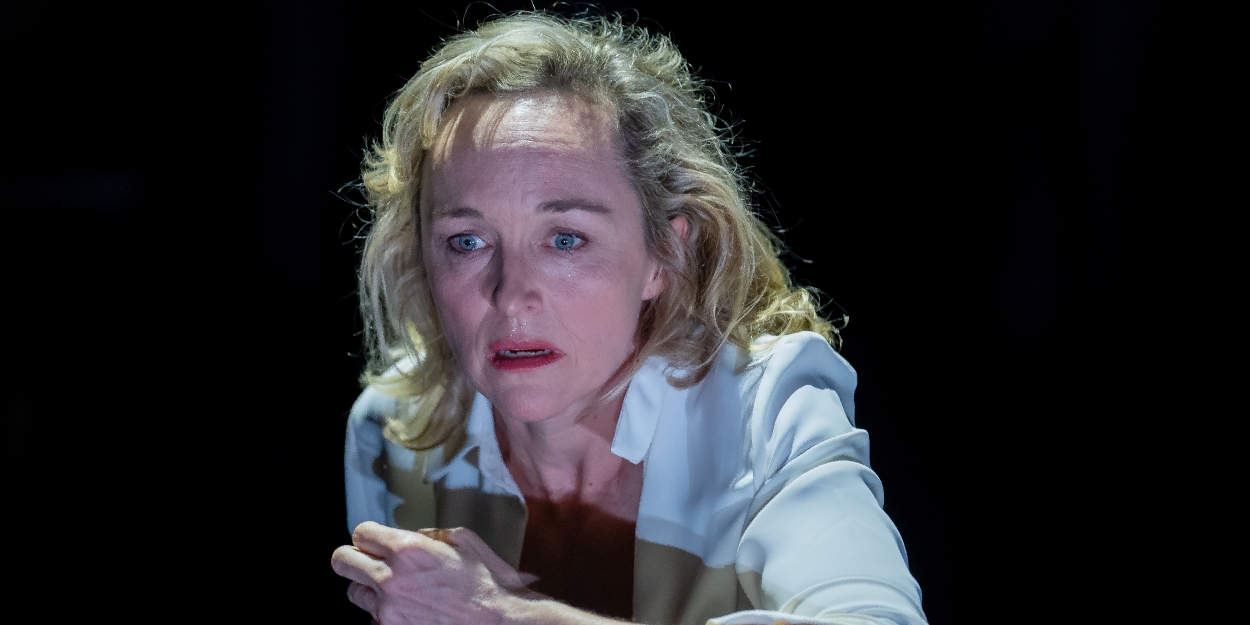Review: PRIMA FACIE at Space Theatre, Adelaide Festival Centre
The play is timely.

Reviewed by Ewart Shaw, Tuesday 2nd May 2023.
The State Theatre Company has brought to the Space, Prima Facie, an intimately personal exploration of the law of sexual assault and rape. The play, by Australian and British playwright and former lawyer, Suzie Miller, has caught the imagination of the theatre-going world as it tells one woman's story, which is the story of so many.
Caroline Craig catches your attention right from the start and holds it to the very end, in an impressive test of intellect and stamina. She, and director, David Mealor, have much to be proud of in this achievement
Craig is Tessa Ensler, barrister-at-law. She loves the role she plays, defending men accused of sexual assault. In the lengthy first part, she revels in her skills, talking lovingly of the way she controls her energy, likening the court appearance to a horse race. There are many laughs for the audience, as she details her preparation. She is smug and, indeed, unlikeable.
Tessa's pride has her riding for a fall. Casual vodka-fuelled sex with a colleague, on his couch as they work late, leads to another meeting. They are both very drunk and the sex is interrupted when she starts vomiting. Damon carries her back to bed and then forces himself on her. He falls asleep and, while he snores, she dresses and heads outside. Some hours later she goes to the police and swears a complaint. Miller and Craig lead us through the confusion of the next few days, before and after she lays criminal charges against her alleged attacker.
After a break of only a few seconds, Tessa returns. Two years and fifty-five days later, after many adjournments, the case comes to court. Tessa is now in the position of the many women, Jenna for example, whom she had once subjected to cross-examination. Jenna's brief presence in the narrative is crucial. She knows she will lose her case but she has to lay the charge to take her stand against her attacker. That theme comes back.
Faced, now, by the power of the Law, but without the protection her gown and wig might have afforded her, she conquers her confusion and, in a breach of court etiquette, calls out the law and the courts for their failure to accept the emotional confusion that can undercut the power of a victim's evidence. Tessa loses the case, though, unlike so many victims, she still has her place in the higher levels of the legal system.
While Tessa is the only person we see, we hear about her friends and colleagues, and get an insight into her working-class family, for she has grown far from her roots. It's her mother whose presence is strongest. She comes to court to support her daughter, not knowing how shocking some of the revelations will be. She's brought her bag, a straw beach bag given to her by Tessa. She holds it tight on her lap as the trial continues. It is an image so clear and so poignant.
There are peripheral contributions to the play from the production team; a few bars of music from Quentin Grant, and a soundscape from Andrew Howard, costumes in black, white, and grey, courtesy of Kathryn Sproul, and the spare lighting design of Nic Mollison. There's a chair, a bag, a robe, and a horsehair wig. No window dressing is provided for this tale.
The play is timely. There's a major rape and defamation trial currently in New York. Canberra is the site of a similarly tragic and ambiguous event. Playwright Miller has been using it as a tool to open up questions about the conduct of rape trials, with its focus on undermining the victim and not questioning the accused. She has spent time adapting the play to the slightly different legal manoeuvres of the British legal system, as compared to ours. It has been translated into more than twenty languages. I can't comment on the differing practices of so many jurisdictions. I can't imagine that the security of victims of sexual assault is much different.
Photography, Matt Byrne.
Reader Reviews

Videos

